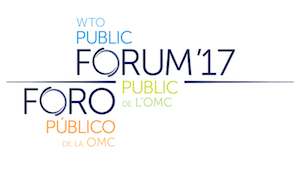Trade without compromise: Digital innovation, social impact and regulatory challenges
26 Sep 2017 17:00h - 18:30h
Event report
[Read more session reports from WTO Public Forum 2017]
The session on ‘Trade without Compromise: Digital Innovation, Social Impact and Regulatory Challenges’ was moderated by Mr Niall Meagher, Executive Director, Advisory Centre on WTO Law (ACWL), who opened the discussions by reminding the audience that dynamics behind digital and trade innovation can entail both positive and negative impacts especially for small or medium economies. The aim of the session was twofold. On the one hand, two real-life case studies illustrated the creation of new frameworks for achieving inclusive trade that works for all. On the other hand, policy and regulatory impediments faced by Micro, Small and Medium Enterprises (MSMEs) were considered.
Mr Zse–Hong Tsai, Chief Human Resources Officer, Asia Silicon Valley Development Agency, Taiwan, presented the first case study on the recently-created platform ‘Asian Silicon Valley Development Plan’ (ASVDP). The project was launched in 2016 by the National Development Council of the Separate Customs Territory of Taiwan. The project is inspired by a double rationale: promoting innovation and optimising innovation in the Internet of Things (IoT) in the Taiwanese entrepreneurship ecosystem. Zse-Hong further affirmed that the innovative component of the project lies in the fact that it is realised through a public-private partnership providing a bridging mechanism between MSMEs, start-ups with digital technologies, and investors through a competitive process. Such a project is implemented through four strategies: firstly, the optimisation of Taiwan’s start-up and entrepreneurship ecosystem; secondly, the establishment of a link between the Taiwanese Silicon Valley and renowed clusters worldwide (through the launch of global projects such as the Global City Team Challenge); thirdly, the creation of a comprehensive IoT value chain including, for example, smart transportation, smart homes, smart agriculture, and smart health; and fourthly, the application of the smart city project to national test beds in different parts of the country.
Ms An-Nung Chen, Co-Founder and Head of Playcares Taiwan, IMPCT Corporation, considered that fair trade fails at reaching its objective on three counts: effectiveness of the plan, magnitude of the action, and transparency of the overall process. By tracking down the coffee trade path, she illustrated that, for this product, fair trade benefit is very limited in its scope as its impact on collectors and communities still remains small. Her start-up, IMPCT Corporation, aims at “making profit for a good cause”, i.e. making a positive social contribution that empowers local women to build and run educational projects in local communities of Central America and South Africa. The system works through a four-stage process consisting of tracking down coffee trade, investing the profits into proven and effective intervention facilities, educating local social communities and, finally, repaying development projects.
The session was closed by Mr Roy Chun Lee, Deputy Executive Director, the Taiwan WTO & RTA Center and CIER (Chung-Hua Institution for Economic Research). Chun Lee considered first that the benefits of digital trades are assessable on three criteria: digital trade is borderless (and as a consequence, it facilitates international trade); it lowers the entry threshold by reducing initial investment and trade cost; and, finally, it widens market access thanks to the proliferation of mobile broadband. He continued by considering that the existing downsides of digital commerce lay in the very nature of internet and cloud computing technology: that is, uncertainty. It is hard for regulators to identify who is behind the cloud and what is inside it. Moreover, further impediments to digital commerce are represented by restrictions on data flow and privacy-related issues as well as the question of denial of access to the internet. He concluded his presentation by illustrating possible approaches that could solve current challenges. In particular, he stressed the need for the WTO to ‘keep up with the digital world agenda’ by regulating the issue with both soft and hard disciplines.
by Marco Lotti
Related topics
Related event

